LEGAL ANALYSIS OF THE EFFECTIVENESS OF LAW ENFORCEMENT AGAINST PERPETRATORS OF DATA FALSIFICATION IN PASSPORT PROCESSING (RESEARCH STUDY AT THE CLASS I SPECIAL IMMIGRATION OFFICE OF TPI BATAM)
Main Article Content
Maichel Fernando
Lagat Parroha Patar Siadari
Bachtiar Simatupang
Data forgery in passport management is a form of crime that has serious implications for the integrity of the immigration system and national security. The Class I Special Immigration Office TPI Batam, as one of Indonesia’s international gateways, is highly vulnerable to identity abuse by individuals or organized networks.This study aims to analyze the legal regulations governing sanctions against data forgery offenders, assess the effectiveness of their implementation in the field, and identify obstacles as well as formulate solutions that immigration officials can undertake to address these issues. This study employs normative juridical and empirical juridical research methods, using statutory and sociological (socio-legal) approaches. Data were obtained through literature reviews of regulations such as Law Number 6 of 2011 on Immigration, Government Regulation Number 31 of 2013 and its amendments, as well as Minister of Law and Human Rights Regulation Number 8 of 2014 in conjunction with Minister of Law and Human Rights Regulation Number 18 of 2022, and combined with interview results and field observations involving officials and the community at the Batam Immigration Office. The research findings indicate that although legal norms regarding the enforcement against data forgery have been formally established, the effectiveness of their implementation is still hindered by internal factors such as limited human resources, technology, and officer competence, as well as external challenges such as increasingly complex crime modes and weak inter-agency coordination. Law enforcement has also not fully reflected substantive justice nor been responsive to the social dynamics of the community. Therefore, it is necessary to strengthen institutional capacity, integrate national data systems, and enhance public legal literacy as more effective preventive and repressive measures in the future
Republik Indonesia, Undang-Undang Nomor 6 Tahun 2011 tentang Keimigrasian, Lembaran Negara Republik Indonesia Tahun 2011 Nomor 52.
Kementerian Hukum dan HAM RI, Peraturan Menteri Hukum dan HAM Nomor 8 Tahun 2014 tentang Paspor dan Dokumen Perjalanan, Jakarta: Direktorat Jenderal Imigrasi, 2014.
Hadjon, Philipus M., Perlindungan Hukum bagi Rakyat Indonesia, Surabaya: PT Bina Ilmu, 2007.
Direktorat Jenderal Imigrasi, Laporan Tahunan 2023: Penegakan Hukum Keimigrasian, Jakarta: Ditjen Imigrasi, 2023.
Putra, Ardiansyah. “Efektivitas Sistem Pengawasan Dokumen Perjalanan di Indonesia.” Jurnal Hukum dan Pembangunan, Vol. 50, No. 2 (2020): 233–247.
Suryawan, Made, “Penanganan Tindak Pidana Pemalsuan Identitas dalam Proses Keimigrasian,” Jurnal Penelitian Hukum De Jure, Vol. 21, No. 4 (2021): 565–580.
International Organization for Migration (IOM), Identity and Document Fraud in Migration Processes, Geneva: IOM Publications, 2022.
Pusat Data dan Informasi Kemenkumham, Statistik Keimigrasian 2022, Jakarta: Kemenkumham RI, 2023.
Nugroho, Tri. “Koordinasi Antar Lembaga dalam Penanganan Kejahatan Dokumen.” Jurnal Ilmu Hukum, Vol. 17, No. 1 (2021): 45–60.
Kurniawan, Arief. “Penguatan Kapasitas Sumber Daya Manusia Keimigrasian.” Jurnal Administrasi Publik, Vol. 9, No. 3 (2020): 101–115.
Hadjon, Philipus M., Pengantar Hukum Administrasi Indonesia, Surabaya: Gadjah Mada University Press, 2015.
Batam Immigration Office, Laporan Penanganan Kasus Pemalsuan Dokumen Paspor, Batam: Kantor Imigrasi Kelas I Khusus TPI Batam, 2023.
Badan Nasional Penempatan dan Perlindungan Tenaga Kerja Indonesia (BNP2TKI), Pedoman Pencegahan Pemalsuan Dokumen, Jakarta: BNP2TKI, 2022.
ASEAN Secretariat, Best Practices on Border and Identity Management, Jakarta: ASEAN Publications, 2021.
UN Office on Drugs and Crime (UNODC), Handbook on Identity-Related Crime, Vienna: UNODC, 2021.






















